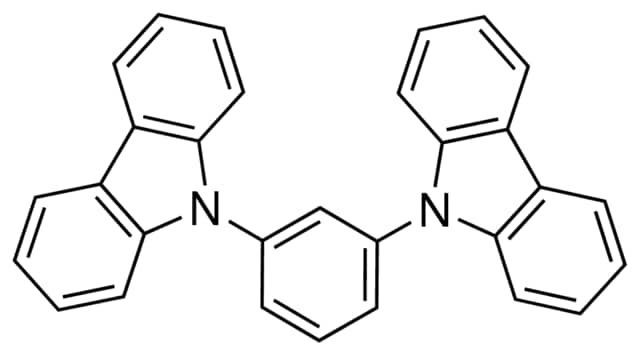mCP (10g) / 10g
Safety Information
Hazard Statements
Precautionary Statements
Pictograms
Properties
| Signal Word | Danger |
Product Description
1,3-Bis(N-carbazolyl)benzene is a polycyclic aromatic compound that features a central benzene ring flanked by two carbazole moieties. These carbazole units contribute to its electronic properties, making it of interest in optoelectronic devices such as organic light-emitting diodes (OLEDs) and organic photovoltaics (OPVs). The compound's ability to absorb and emit light efficiently, along with its good hole transport properties, positions it as a valuable material in the development of next-generation displays and solar cells.
Application:
In the field of electronics, 1,3-bis(N-carbazolyl)benzene is utilized as a host material in OLEDs and OPVs due to its high electron affinity and triplet energy level. Its use enhances device performance by improving charge carrier mobility and reducing recombination losses. Additionally, its role in photophysical studies provides insights into the design of advanced materials for lighting and energy conversion technologies.
Articles:
- Understanding Excited-State Relaxation in 1,3-Bis(N-carbazolyl)benzene, a Host Material for Organic Light-Emitting Diodes
Publication Date: February 28, 2023
Marius Morgenroth, Thomas Lenzer, and Kawon Oum
-https://doi.org/10.1021/acs.jpcc.2c07440
- A Promising Thermodynamic Study of Hole Transport Materials to Develop Solar Cells: 1,3-Bis(N-carbazolyl)benzene and 1,4-Bis(diphenylamino)benzene
Publication Date: 7 January 2022
Juan Mentado-Morales, Arturo Ximello-Hernández, Javier Salinas-Luna, Vera L. S. Freitas and Maria D. M. C. Ribeiro da Silva 4
-https://doi.org/10.3390/molecules27020381
-Electrical conductivity of 1,3-bis(N-carbazolyl)benzene (mCP) on a hole-transport bilayer
Publication Date: 09 Aug 2021
Ryo Sato, Satoru Aoyama, Yoshiyuki Seike & Tatsuo Mori
